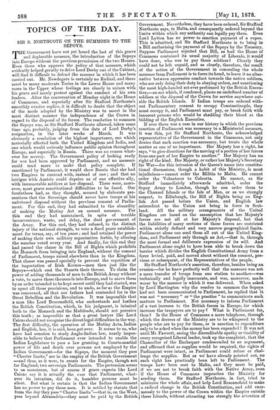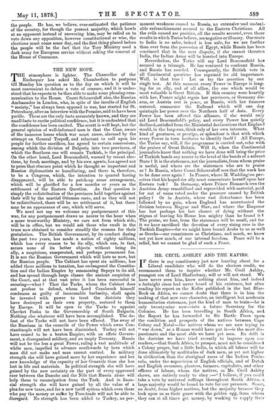TOPICS OF THE DAY.
SIR S. NORTHCOTE ON THE SUMMONS TO THE SEPOYS. TETE Government have not yet heard the last of this grave and deplorable measure, the introduction of the Sepoys into Europe without the previous permission of the two Houses. Even those who approve the policy of that measure, which evidently helped greatly to drive Lord Derby out of the Cabinet, will find it difficult to defend the manner in which it has been carried out. Mr. Newdegate is certainly no Radical, and there must be many moderate Tories in the Lower House and many more in the Upper whose feelings are closely in unison with his grave and manly protest against the conduct of his own leaders. After the conversation of Monday night in the House of Commons, and especially after Sir Stafford Northcote's smoothly evasive replies, it is difficult to doubt that the object of the mode adopted by the Ministry was to assert in the most distinct manner the independence of the Crown in regard to the disposal of its forces. The resolution to summon the Sepoys was, as Sir Stafford Northcote allowed, taken some time ago, probably, judging from the date of Lord Derby's resignation, in the later weeks of March. It was obviously a resolution of the highest importance, one which materially affected both the United Kingdom and India, and one which would seriously influence public opinion throughout Europe, and especially in Russia. There was no reason what- ever for secrecy. The Government policy of looking ready for war had been approved by Parliament, and no measure could tend more to make that policy complete. If sanctioned by Parliament, it would show Russia that she had two Empires to contend with, instead of one ; and that no intrigue with Austria could deprive us of one effective ally, with innumerable soldiers at her disposal. There were, more- over, most grave constitutional difficulties to be faced. Our forefathers had, as they thought, secured by elaborate pre- cautions that the Sovereign should never have troops at his unfettered disposal without the previous consent of Parlia- ment. For this end, they had submitted to the absurdity of making the Mutiny Act an annual measure. For this end they had maintained, in spite of terrible inconvenience, waste, and delay, the dual government of the Army. For this end, they had refused, to the distinct injury of the national strength, to vote a fixed peace establish- ment for terms, say, of ten years ; and had retained the power of making their own military organisation feeble, by altering the number voted every year. And finally, for this end they had passed the clause in the Bill of Rights which prohibits the Monarch from bringing into England, without the consent of Parliament, troops raised elsewhere than in the Kingdom. That clause was passed specially to prevent the repetition of the importation of Irish Kernes—men then just like the Sepoys—which coat the Stuarts their throne. To claim the power of adding thousands of men to the British Army without a vote, to move those thousands into Europe, and to move them by an order intended to be kept secret until they had started, was to upset all these provisions, and to undo, as far as the Empire was concerned, all that our fathers had contended for in the Great Rebellion and the Revolution. It was impossible that a man like Lord Beaconsfield, who understands and loathes the British Constitution, which, in his judgment, is inimical both to the Monarch and the Multitude, should not perceive this truth ; as impossible as that a great lawyer like Lord Cairns should not recognise the direct legal difficulties in the way. The first difficulty, the operation of the Mutiny Acts, Indian and English, has, it is said, been got over. It seems to us, who have had occasion to study Anglo-Indian law, nearly impos- sible to believe that Parliament ever intended to enable the Indian Legislature to pass a law granting to Courts-martial power of life and death over persons not employed by the Indian Government—for the Sepoys, the moment they pass "Charter limits," are in the employ of the British Government —and thus, as it were, to create for the Empire, though not for England, two sovereign Parliaments. The pretension seems to .us monstrous, but of course if grave experts like Lord Cairns say it is actually the case that Parliament, what- ever its intention, did do it, humbler persons must be silent. But what is certain is that the Indian Government has no power to pay these men. It is settled by statute that from the day they pass "Charter limits "—that is, on the West, pass beyond Alexandria—they must be paid by the British Government. Nevertheless, they have been ordered, Sir Stafford Northcote says, to Malta, and consequently ordered beyond the limits within which any authority can legally pay them. Even Lord Lytton has no power to sanction payment of a rupee. This is admitted, and Sir Stafford Northcote is to bring in a Bill authorising the payment of the Sepoys by the Treasury. Suppose Parliament rejected that Bill, as had the House of Commons contained its usual majority of Liberals, it would have done, who was to pay those soldiers? Clearly they could not be left unpaid, and as clearly, therefore, the result of the action of the Government in concealing the whole measure from Parliament is to force its hand, to leave it no alter- native between oppressive conduct towards the native soldiers, who are only doing their duty in obeying orders, and sanctioning the most high-banded act ever performed by the British Execu- tive,—an act which, if condoned, places an undefined number of soldiers at the disposal of the Crown for service anywhere out- side the British Islands. If Indian troops are ordered with- out Parliamentary consent to occupy Constantinople, they must occupy it, and Parliament must pay, or break faith with innocent persons who would be shedding their blood at the bidding of the English Executive.
If ever there was a case in our history in which the previous sanction of Parliament was necessary to a Ministerial measure,. it was this, yet Sir Stafford Northcote, the acknowledged representative of the Government in the Commons, not only denies that such sanction was necessary, but treats the whole matter as one of no importance. Her Majesty has a right, he says, "to give directions for the moving of a portion of her forces from one part of her Empire to another." Her Majesty has no right of the kind. Her Majesty, or rather her Majesty's Secretary for War—for this intrusion of the Queen's name into constitu- tional discussions, though a habit of this Ministry, is most injudicious— cannot order the Militia to Malta. He cannot order the Volunteers to Calcutta. He cannot, as Sir Stafford immediately afterwards admitted, order the Sepoy Army to London, though he can order them tcr the Channel Islands or the Isle of Man, or as we strongly suspect, to Edinburgh, the Bill of Rights being an Eng- lish Act passed before the Union, and English law antecedent to the Union not being in force in Scot- land. All the military arrangements of the United Kingdom are based on the assumption that her Majesty's forces are not all at her Majesty's disposal, but that the liabilities of many sections of those forces are restricted within strictly defined and very narrow geographical limits. Parliament alone can send them all out of the United King- dom, and Parliament only through an Act,—that is, through, the most formal and deliberate expression of its will. And Parliament alone ought to have been able to break down the barrier which divides the English Constitutional Army from a force levied, paid, and moved about without the consent, pre- vious or subsequent, of the Representatives of the people.
Sir Stafford Northcote's assertion, therefore, besides being an evasion—for he knew perfectly well that the measure was not a mere transfer of troops from one station to another—was- technically and legally inaccurate, and was, moreover, made worse by the manner in which it was delivered. When asked. by Lord Hartington why the resolve to summon the Sepoys had not been communicated to Parliament, he replied that it. was not " necessary " or "the practice" to communicate such. matters to Parliament. Not necessary to inform Parliament of a vast increase to the British forces in Europe, for which increase the taxpayers are to pay? What is Parliament for,, then ? Is the House of Commons a mere telephone, through which the decrees of the Ministry are to be whispered to the. people who are to pay for them, or is sanction to expenditure only to be asked when the money has been expended ? It was not until Mr. Fawcett, seeing the discreditable apathy or timidity of every recognised Liberal leader, took up the complaint, that the Chancellor of the Exchequer condescended to an argument, and affirmed .that as supplies would be required, the rights of Parliament were intact, as Parliament could refuse or chal- lenge the supplies. But as we' have already pointed out, no such right has practically been left to Parliament. The troops have been sent to Malta, and they must be paid, if we are not to break faith with the Native Army, even if the House of Commons impeaches the Ministry for sending them. Sir Stafford Northcote, in fact, tried to minimise the whole affair, and help Lord Beaconsfield to make a radical change in the British Constitution, and add enor- mously to the power of the Crown within the Empire outside these Islands, without attracting too strongly the attention of the people. He has we believe, over-estimated the patience of the country, for though the present majority, which howls at an opponent instead of answering him, may be relied on to vote down any opposition, however constitutional or wise the elections must come some day, and the first thing placed before the people will be the fact that the Tory Ministry used a dark army for European service without asking the consent of the House of Commons.







































 Previous page
Previous page